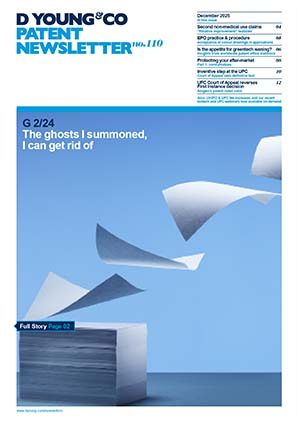No deal Brexit - changes to UK patent & SPC law
If the UK leaves the EU without a deal, the Patents (Amendment) (EU Exit) Regulations 2019 will enter into force on the UK’s day of exit. This legislation allows the majority of EU law relating to patents and supplementary protection certificates (SPCs) to be retained in the UK.
Importantly, the UK will remain a contracting state of the European Patent Convention (EPC), because this treaty is separate from the EU. Therefore, following Brexit, there will be no change to the way UK and European patents can be filed and prosecuted, or to the rights obtained after grant of a patent. Accordingly, UK patent protection will continue to be available via the European Patent Office (EPO) and the UK Intellectual Property Office (IPO). Similarly, European patent attorneys based in the UK, such as the D Young & Co patent team, will still be able to represent clients before the EPO.
However, in the event of a no deal Brexit, there will be some changes to patent and SPC law in the UK. Updated guidance regarding these changes has recently been published by the UK Government . Notable updates and changes that are likely to impact patent and SPC practice in the UK are summarised below.
SPC manufacturing and stockpiling waiver
A new SPC manufacturing and stockpiling waiver regulation entered into force in the EU on 01 July 2019, to encourage the competitiveness of generic and biosimilar manufacturers. The regulation provides an SPC infringement exemption for (i) manufacturing for export outside of the EU; and (ii) stockpiling in the final six months of the SPC term, for entry to the EU market immediately after SPC expiry. The waiver regulation entered into force after the Patents (Amendment) (EU Exit) Regulations 2019 were prepared. However, legislation will be passed through Parliament to retain this waiver in the UK after Brexit, subject to potential fixes to confirm it is working properly.
Security for costs
For proceedings before the UKIPO, an order for security for costs may be granted against certain parties when there is reason to believe that they would be unable to pay costs if ordered to do so. Currently, such an order cannot be made against a European Economic Area (EEA) resident. However, in the event of a no deal Brexit, any person resident outside the UK may be subject to an order for security for costs for proceedings before the UKIPO.
Paediatric extensions
The maximum term of an SPC is usually five years from expiry of the basic patent. However, this may be extended by six months for medicinal products for which agreed paediatric studies have been carried out. The existing EU legislation requires evidence of marketing authorisations covering the product across the EEA for a paediatric extension to be granted, and existing extensions can be challenged on this basis. This requirement will still apply to paediatric extensions that are pending or granted when the UK leaves the EU. However, even in the event of a no deal Brexit, such evidence will not be required for new UK paediatric extension applications: it will be sufficient to show that the product is authorised in the UK.
Orphan medicines
Existing EU legislation aims to provide incentives for developing treatments for severe diseases that affect no more than five in 10,000 people in the EU (so-called “orphan medicinal products”) in the form of 10-year market exclusivity. This will be replicated in the UK national legislation when the UK leaves the EU, and the term of protection (ten years from the date of the marketing authorisation) will remain the same – but this will be calculated from the first marketing authorisation in the UK or EEA, whichever occurs first. When the UK leaves the EU, the Medicines and Healthcare Products Regulatory Agency (MHRA) will review applications for UK orphan designation, and will apply some UK-specific criteria, including limited prevalence of the disease and a lack of satisfactory alternatives to the medicine in the UK. Such applications will be examined in parallel to the corresponding UK marketing authorisation applications.
CJEU judgments
In the event of a no deal Brexit, existing judgments of the Court of Justice of the European Union (CJEU) will continue to apply. CJEU judgments issued after the UK leaves the EU will not be binding, but may be taken into account. Also, the UK courts will no longer be able to refer questions to the CJEU regarding interpretation of SPC legislation.
Unified Patent Court
If the Unified Patent Court (UPC) comes into force, it will hear cases relating to European patents and SPCs, and unitary patents (UPs). In the event that the UPC comes into force and the UK needs to withdraw from the UPC and the unitary patent, UK and EU businesses will be able to use the UPC and unitary patents to protect inventions in the EU. Accordingly, UK businesses will also be open to litigation within the UPC based on their actions in the EU. However, UK and EU businesses would not be able to use the UPC and unitary patents to protect inventions in the UK. Instead, they must use national rights obtained via the UKIPO or the EPO.

